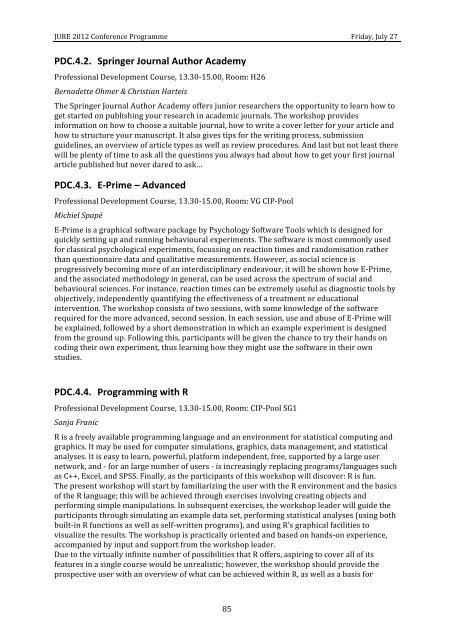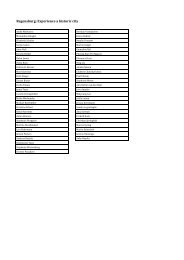JURE 2012 Programme book - EARLI Jure 2012
JURE 2012 Programme book - EARLI Jure 2012
JURE 2012 Programme book - EARLI Jure 2012
Create successful ePaper yourself
Turn your PDF publications into a flip-book with our unique Google optimized e-Paper software.
<strong>JURE</strong> <strong>2012</strong> Conference <strong>Programme</strong> Friday, July 27<br />
PDC.4.2. Springer Journal Author Academy<br />
Professional Development Course, 13.30-‐15.00, Room: H26<br />
Bernadette Ohmer & Christian Harteis<br />
The Springer Journal Author Academy offers junior researchers the opportunity to learn how to<br />
get started on publishing your research in academic journals. The workshop provides<br />
information on how to choose a suitable journal, how to write a cover letter for your article and<br />
how to structure your manuscript. It also gives tips for the writing process, submission<br />
guidelines, an overview of article types as well as review procedures. And last but not least there<br />
will be plenty of time to ask all the questions you always had about how to get your first journal<br />
article published but never dared to ask…<br />
PDC.4.3. E-‐Prime – Advanced<br />
Professional Development Course, 13.30-‐15.00, Room: VG CIP-‐Pool<br />
Michiel Spapé<br />
E-‐Prime is a graphical software package by Psychology Software Tools which is designed for<br />
quickly setting up and running behavioural experiments. The software is most commonly used<br />
for classical psychological experiments, focussing on reaction times and randomisation rather<br />
than questionnaire data and qualitative measurements. However, as social science is<br />
progressively becoming more of an interdisciplinary endeavour, it will be shown how E-‐Prime,<br />
and the associated methodology in general, can be used across the spectrum of social and<br />
behavioural sciences. For instance, reaction times can be extremely useful as diagnostic tools by<br />
objectively, independently quantifying the effectiveness of a treatment or educational<br />
intervention. The workshop consists of two sessions, with some knowledge of the software<br />
required for the more advanced, second session. In each session, use and abuse of E-‐Prime will<br />
be explained, followed by a short demonstration in which an example experiment is designed<br />
from the ground up. Following this, participants will be given the chance to try their hands on<br />
coding their own experiment, thus learning how they might use the software in their own<br />
studies.<br />
PDC.4.4. Programming with R<br />
Professional Development Course, 13.30-‐15.00, Room: CIP-‐Pool SG1<br />
Sanja Franic<br />
R is a freely available programming language and an environment for statistical computing and<br />
graphics. It may be used for computer simulations, graphics, data management, and statistical<br />
analyses. It is easy to learn, powerful, platform independent, free, supported by a large user<br />
network, and -‐ for an large number of users -‐ is increasingly replacing programs/languages such<br />
as C++, Excel, and SPSS. Finally, as the participants of this workshop will discover: R is fun.<br />
The present workshop will start by familiarizing the user with the R environment and the basics<br />
of the R language; this will be achieved through exercises involving creating objects and<br />
performing simple manipulations. In subsequent exercises, the workshop leader will guide the<br />
participants through simulating an example data set, performing statistical analyses (using both<br />
built-‐in R functions as well as self-‐written programs), and using R’s graphical facilities to<br />
visualize the results. The workshop is practically oriented and based on hands-‐on experience,<br />
accompanied by input and support from the workshop leader.<br />
Due to the virtually infinite number of possibilities that R offers, aspiring to cover all of its<br />
features in a single course would be unrealistic; however, the workshop should provide the<br />
prospective user with an overview of what can be achieved within R, as well as a basis for<br />
85



